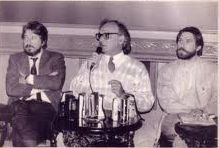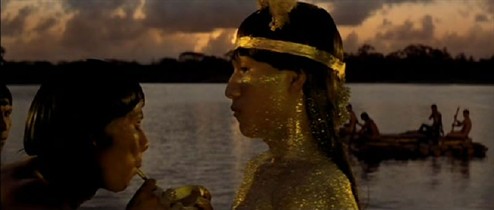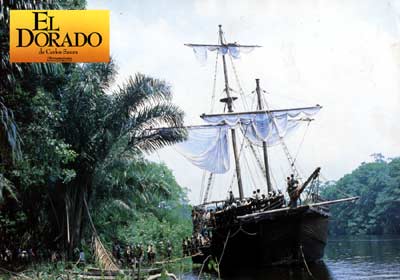In 1985, having settled down, provisionally, in a luxurious
office on Velazquez St nº18, though with my mind set on purchasing
another office on nº 12 of the same street, I decided to go for it
all. For me, that meant to continue working with a talented person
like Fernando Trueba, but to also set my sights on other big shots,
and the most sought after director at the time was Carlos Saura.
The latter had directed most of his films with producer Elías
Querejeta, although recently he had shot for Emiliano Piedra the
trilogy "Bodas de sangre, "Carmen" and "El amor brujo".

Since 1975, I'd been obsessed by the idea of making a film about
the firing squad executions ordered by the Franco regime in
December of that same year. Thus, and taking advantage of the
release of Pedro J. Ramírez's a book about the executions, "El año
que murió Franco" (The Year that Franco Died), I requested a script
on the subject from Manuel Gutiérrez Aragón and Carmen Rico Godoy.
I considered Carlos Saura as the right director to do the screen
adaptation. I arranged to meet him in La Posada de la Villa, near
Cinearte -where he was editing & mixing "El amor brujo." I
arrived, nervous, with the script inside an envelope. But I never
actually opened it because as Carlos explained, over our aperitif,
if I wanted to do a film with him, it had to be "El Dorado". That
was an expensive, complicated and risky project he had began
developing with Elías Querejeta, and which neither of them or
Emilio Piedra dared to deal with anymore on the grounds that it
might turn out to be too big a venture. That was how I ended up
being offered the film project after the two producers, whom I most
admired and felt closest to, had turned down.

Before making a decision, I discussed it with people who my
business environment. My partners, Maldonado and Velasco, supported
the idea. Others whose opinion I also respected, like Fernando
Trueba, were very positive about the project too. Thus I decided to
produce the film that would be remembered, unfairly in my opinion,
as the most expensive Spanish film ever made up to that point.
"El Dorado" as it turned out, involved long preparations and a
terribly complex filming. During this first period, I launched
other films like "El año de las luces" (The Year of Enlightenment),
directed by Fernando Trueba; "El pecador impecable" (The Impeccable
Sinner), based on a novel by Manuel Hidalgo and directed by Augusto
Martínez Torres; "Los negros también comen" (How Good the Whites
Are), with Rafael Azcona and Marco Ferreri, and "Remando al viento"
(Rowing with the Wind), directed by Gonzalo Suárez, in which we
discovered two stars: Hugh Grant and Elizabeth Hurley.
I suddenly found myself shooting five films in three continents.
I spent that stage of my life on planes and in airports. But I
managed to pull through with relative success and was able to
consolidate my position as a producer and became, in the eyes of my
friends, the number one Spanish producer, (a flirtatious remark I
have always appreciated).
My major worries and disappointments of those days were not
caused by the films I was involved in but rather the result of
incomprehension and lack of understanding by part in the
specialized press and the Ministry of Culture regarding my
ventures.
Some journalists went as far as saying that "El Dorado" was a
cover for sending film roll containers full of drugs from Costa
Rica to Spain. The Ministry never supported me at all. On the
contrary, it would hamper my proposals, fearful that, given my
financial vulnerability, it might find itself mixed up in a
scandal.
It was ironic that, in those days, various veteran producers,
with the complicity of ABC newspaper under Luis Mª. Ansón, branded
me a socialist and on the take of the Government. The truth is that
the Dirección General de Cine (the official Spanish Film Office)
was making things extremely difficult for me. Suffice it to say,
for example, that the "advance payment" I received as a subsidy for
"El Dorado" wasn't given to me until they were sure we had finished
shooting the film.
I can prove -although I didn't do so at the time for obvious
reasons- that it wasn't the Socialist Party, the PSOE,in power
then, who supported me financially but rather the Vatican. Vatican
support came through a religious order established in Spain that
aimed and eventually succeeded in rendering profitable its surplus
liquidity by investing in "El Dorado" rather than in capital
markets or other financial assets that were theoretically safer and
might have reported higher yields. Hundreds of thousands of dollars
were thus transferred to my bank account in a totally legal way
through the delivery of checks to finance the finishing of "El
Dorado" and other movies like "Las edades de Lulú" (The Ages
of Lulu) and "Remando al viento" (Rowing with the Wind), while some
detractors continued to claim that it was the Film Office and the
Socialist party who were supporting me.
 Turning
our attention back to "El Dorado," the project took us to the
Atlantic coast of Costa Rica, specifically to Puerto Limón. There,
in the middle of the jungle, we had to fell trees, saw logs, cut
clearings in the forests with machetes to build boats, barges and
set designs. All in all, we spent a whole year there until we
finished the filming, although some members of our expedition, like
Francisco Amaro and -above all- José Luis García, had to remain
there (practically as hostages) when it was over to clear up the
bills we incurred in Costa Rica. I have indelible memories of
the days when the film premiered in the presence of the King and
Queen of Spain and the screening was in competition at the Cannes
Festival. I also recall clearly my very close relationship with the
technicians and actors during the filming. What I missed most at
the time though was the Berlin Film Festival where "El año de las
luces" (The Year of Enlightenment" was most successful, but I was
held up in Costa Rica filming El Dorado and couldn't attend the
event.
Turning
our attention back to "El Dorado," the project took us to the
Atlantic coast of Costa Rica, specifically to Puerto Limón. There,
in the middle of the jungle, we had to fell trees, saw logs, cut
clearings in the forests with machetes to build boats, barges and
set designs. All in all, we spent a whole year there until we
finished the filming, although some members of our expedition, like
Francisco Amaro and -above all- José Luis García, had to remain
there (practically as hostages) when it was over to clear up the
bills we incurred in Costa Rica. I have indelible memories of
the days when the film premiered in the presence of the King and
Queen of Spain and the screening was in competition at the Cannes
Festival. I also recall clearly my very close relationship with the
technicians and actors during the filming. What I missed most at
the time though was the Berlin Film Festival where "El año de las
luces" (The Year of Enlightenment" was most successful, but I was
held up in Costa Rica filming El Dorado and couldn't attend the
event.
As regards the other films I was involved in during that period,
my work with Marco Ferreri is worth noting, although by then, and
after my experience with Welles -one of joy and sorrow- I wasn't
too keen on "geniuses". Ferreri was an original and talented
director but I think I met him too late, when his physical and
mental faculties